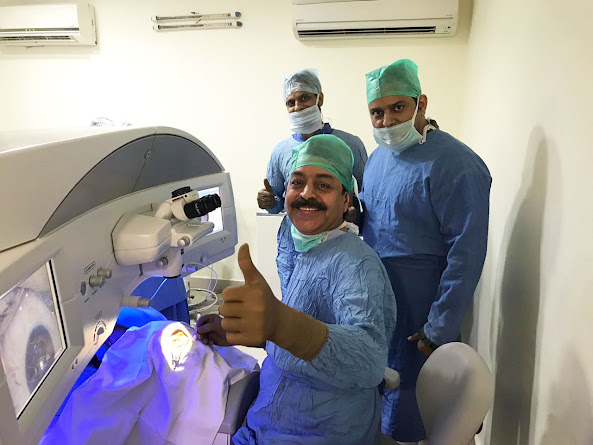The centre provides solutions for various eye conditions, including cataracts, glaucoma, refractive errors, and general eye health concerns. Whether you require routine eye examinations, vision correction, or specialized treatment, Bajaj Eye Care Centre delivers personalized care to meet your specific needs.
Dr Rajiv Bajaj is a renowned Ophthalmologist practising in the Pitampura area of Delhi. He is the founder of Bajaj Eye Care Centre, a centre equipped with ultra-modern facilities that provide solutions to a wide range of eye ailments. The centre known for its professional excellence is present on the panel of leading insurance companies, Govt. Organizations and the majority of TPA's for Cashless Mediclaim Facilities.
Dr Bajaj is an MBBS graduate from Maulana Azad Medical College, Delhi. He further pursued post graduation MS in Ophthalmology from Delhi University which involved the study of the anatomy, physiology and detailed study of the surgical problems of the eyes.
Prior to independent practice, Dr Bajaj served at Safdarjang Hospital, Dr Ram Manohar Lohia Hospital, Maharaja Agrasen Hospital and Sant Parmanand Hospital which have been his immense sources of experience in the ophthalmic field. He later established Bajaj Eye Care Centre which caters to patients from Delhi and NCR.
As a part of surgical education, Dr Bajaj has demonstrated live surgery of MICS at national-level conferences. He is among the first few doctors to incorporate advanced technology such as MICS, Phaco surgery and Lasik Surgery in his practice.
- Regular Eye Exams: Schedule routine eye exams for yourself and your family, even for young children, as early detection of eye disorders can aid in timely treatment.
- Balanced Diet: Consume a variety of fruits and vegetables, particularly leafy greens like kale and spinach, to support healthy eyesight. Fish rich in omega-3 fatty acids, such as salmon and tuna, can also be beneficial for eye health.
- Maintain a Healthy Weight: Regular exercise and a healthy lifestyle contribute to maintaining optimal body weight, reducing the risk of diabetes and other health conditions that can affect vision.
- Promptly Report Vision Changes: If you experience blurred vision, frequent squinting, or any other visual problems, communicate them to your parents, teachers, or eye doctor for further evaluation.
- Wear Prescription Glasses: If you require corrective eyewear, ensure you wear clean and properly fitted glasses. Consult with an adult on the appropriate cleaning and storage methods for your glasses.
- Practice Good Hygiene: Maintain proper hand hygiene, especially when handling contact lenses, to prevent eye infections.
- Protect Your Eyes: Use appropriate eye protection when participating in sports or working with chemicals. Wearing protective eyewear can prevent eye injuries and ensure long-term eye health.
- UV Protection: Shield your eyes from harmful ultraviolet (UV) rays by wearing sunglasses that block 99% or 100% of UVA and UVB rays.
- Take Regular Breaks: If you spend extended periods looking at screens, follow the 20-20-20 rule. Every 20 minutes, take a 20-second break and focus on an object approximately 20 feet away to reduce eye strain.
Subscribe by Email
Follow Updates Articles from This Blog via Email


No Comments